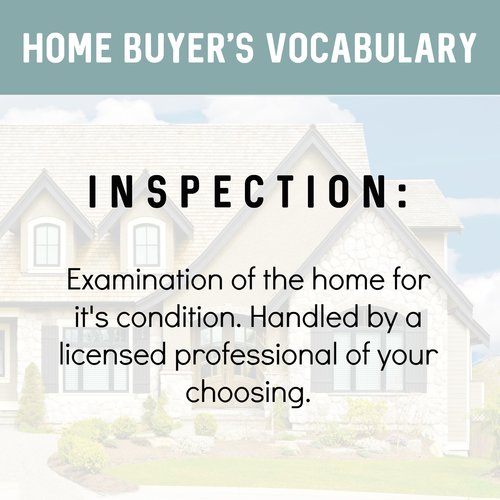Real Estate Inspections can be a very sticky subject at times. It's important that you know, not all inspectors are the same. We're asked all the time for a "good inspector". I'd like to ask you... what is a good inspector to you? Some people qualify the inspector by the price tag or their certifications. I personally find their experience in construction, background and language on their reports is very revealing as to their ability to give me the full story on the home. Certifications are great, but passing a test doesn't make you qualified.
The truth is, you are hiring a general home inspector to walk in to someone else's home, spend 3 hours navigating someone else's furniture and belongings in order to flip all the switches, open doors, open windows, look at plumbing, electrical and structural things and give you a full report. That's cute.... The number 1 complaint I hear after a buyer has been in their home for some time is, "the inspector missed ........ " Well, yeah, cause the inspector didn't live in the home at all, they just walked around and touched all the things for a few hours. So, here are a few things you should know before you go in to the inspections on your new purchase. As well as some questions to ask.
- Home inspectors are known as 'general home inspectors'. In other words, they're like your general, family doctor. They take the homes temperature and tell it to say "ahhh"... read the disclosures, and all about how it only has 2 alcoholic beverages a week and then they tell you to seek advice from a specialist. Here's a list of specialists that you may want to consult with due to the general home inspector not being the expert on all things.... (these are just the more common, there are many more, please see the buyer advisory)
- Roofer - Ask your inspector, do they get on the roof, or do they just look at it from a step stool on the ground. Most will tell you, they are not comfortable getting on a roof. Well, it's hard to know if the underlayment is gone, if you're not lifting tiles.
- Electrician - The inspector may tell you if an outlet is working, but they won't tell you why it's not.
- Plumber - Sure, an inspector will tell you that the toilet flushes, but a plumber will tell you if there is a tree root in your plumbing.
- HVAC - Ask your inspector how detailed they get with the AC. If you're getting a warranty, chances are, it's mostly to protect you if something goes wrong with this big ticket item. How do you prove that it worked fine when you bought the place if the 'non-AC-expert', inspector simply reports "AC was working" or "Did not test heating components as exterior temps were too high". Aiming a thermometer at the air duct, although super fun according to my son... may not be thorough enough to protect you later on.
- Sprinkler lines - You may want to ask the inspector if he tests your irrigation system. Most don't even touch them. Sure, they go out all the time and there's no guarantee they will work well for you.... good reason to exclude this from their liability. However, wouldn't it be nice to know how the system works and if it does. The AZ purchase contract (2017) states that the home is being sold in its current condition. If you inspect and the sprinklers work, they will have to be working at close. Protect yourself.
- Pool - Ask the inspector if they check the pool pump and system. It's one thing if they don't know much about it, but some won't touch the units. Are there any leaks evident? Does it make weird noises? How do I turn it on when I own it? This is, in my opinion, one of those things you want to know more about before you move in.
- Pest/Termite - Ask the inspector if they will look for signs of roof rats or termites. Most will give you a heads up, to encourage you to further investigate, and others will have contacts that they have, offering discount on inspections. Just remember, this inspection can run anywhere from $40-$75, but they are also susceptible to missing something they can't get to, like in the wall or under insulation in the attic. Price alone should not determine who you hire.
- People assume that a home inspector is there to tell you what has to be done before you buy the home. WRONG. Think of the home inspection as more of a home manual, a honey do list, a heads up on what to expect when you move in. There may be missing light bulbs, broken outlet plates, broken window locks, doors out of level, faucets that don't stay on unless the handle is all the way up, sinks that have a leaking overflow line, door jams with cracks, windows that are tough to open fully, doors that swell in the monsoon season, insulation missing from a section of the attic that wasn't visible from the scuttle hole (because they're not required to go in the attic. Ask your inspector if they go in or just peak in). Etc etc. The truth is, you're buying a used home and you should expect that upon moving in, you'll be inheriting some of these issues.

- Home inspectors cannot see through walls. Some may bring a device to seek out moisture or temperature variations behind the wall, but most will not, as the further you claim to be able to look, the more liability you put on yourself if you miss something. They may tell you that the outlets check out as grounded, and then you find out they're false ground and you have electrical repairs to do. Or they may tell you that the plumbing looks good, only to find out that there's been a pin hole leak in the wall where the owner hung a picture and pierced the Pex with a nail, which has been slowly leaking for 10 years.
- You should also notate that most inspectors, while happy to point out the obvious, may miss notating things that stand out, visibly. If you walk into a home and see that there is broken tiles, or a crack in the drywall... most inspectors will also point those things out, they're hard to miss. But ask your inspector, how thorough are the reports? Ask to see a copy of a sample report if you want to get a feel for how they work. I often see some of the more obvious things missed on reports, and frankly, it's because the inspector is there to tell you about all the things you can't see. So, sometimes, they breeze over the things that you obviously can see.
- Ask the inspector what they do about checking under rugs, behind sofa's and TV's etc. In one house, we found that under the living room rug lay a patchwork of random tiles the seller forgot to mention. Another, a rug in front of a dishwasher was strategically hiding missing tiles (the dishwasher wouldn't fit under the granite with the tiles there). The seller assumed that was discovered in inspections. Nope. Another rug, we discovered later, was GLUED to the carpet. Really people? Don't do that. Other discoveries may be missing outlet covers or baseboards behind furniture, or unfinished wall accents behind big tv's. Garage's can hide many problems behind stacked boxes and tools. If the inspector is unwilling to move things, you may want to ensure that the seller will have the home inspection ready.
Overall, the home inspector is there to help you go in to such a huge purchase with your eyes wide open. But please remember, the home inspector is limited by laws, liability insurance and the fact that they're human (I assume). They are great to have, but don't rely on 100% of the inspection. Remember, this is not their inspection, this is yours. If it matters to you, check it out. Feel free to check all the faucets, flip all the switches, open all the doors or hire more people to touch more things... In Arizona, it is the buyers responsibility to inspect and discover, we're just hear to guide you through the process.


Comments(0)